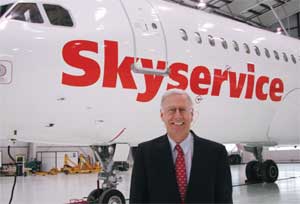
Features
Business Aviation
One on One with Russ Payne, CEO of Skyservice
When we started the airline in 1986, we already had offices and maintenance facilities in the Fixed Base Operations hangars.
October 1, 2007 By Darren Locke
 Skyservice Airlines is one part of a diversified group of aviation
Skyservice Airlines is one part of a diversified group of aviation
companies. How has this strategy benefited the charter operation?
When
we started the airline in 1986, we already had offices and maintenance
facilities in the Fixed Base Operations hangars. We basically hit the
floor running with the airline and our own support environment from day
one. We had flight operations on the business aviation side, which
contributed very quickly to our ability to put out quality product and
services in all respects.
It was a different course of action
than most of the new airlines that have started in Canada, which
contract out an awful lot of different functions. We contract out very
little.
One of the guiding principles Skyservice had even before
the airline was established was our focus on quality. That includes
building a quality work environment. It’s the attitude and dedication
of our employees that makes us what we are – I just can’t say enough
about them.
Do you expect the airline will continue as a charter
carrier, or do you think there is an opportunity to operate scheduled
services also?
For the foreseeable future I would see us
operating as a charter carrier. We have looked at some scheduled and
international services in the past, and we will continue to examine
them in the future. But we have taken a very, very selective approach
to growth. First and foremost, we’ll be profitable over the long term,
and growth will be well thought-out. At present, we do not have plans
to enter into scheduled services – but I would never say never.
There
is a school of thought that an airline can save up to 25% in
maintenance costs by operating a fleet supported by one aircraft. The
Skyservice fleet consists of Airbus A319, A320 and A330 aircraft. Do
you agree?
We haven’t carried out any comparative studies of
ourselves versus multi-fleet operators, so I can’t comment on the 25%
number. From maintenance to engineering planning, inventory management,
purchasing and everything else, it is very much simplified by having a
common fleet – but to a point. Even though an A330 may have comparable
performance characteristics and capabilities, it is still a different
airplane.
Do you expect that Skyservice will add aircraft such as the Airbus A340 or A380 to the fleet as industry growth returns?
Certainly
our main focus will be on growing the Airbus fleet in the future. I do
not foresee adding the A340 or A380. Again, you never say never, but in
terms of the A380, I would say there’s not much probability.
On
two separate occasions since 9/11, US airlines have received financial
assistance from the government. Has this contributed to a more uneven
North American playing field?
Yes. Look at the financial results
of some of the carriers in the US, and the assistance basically became
the profit in the quarters when they received it. We were very
disappointed that the US government acted and the Canadian government
elected not to. Instead, the downloading of security costs and a lot of
other [taxes and fees] have served to widen the gap between where we
should be and where we are.